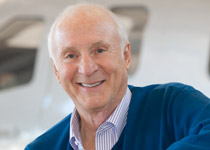Safety in flight relies on the health of both man and machine. Most of us are thorough and meticulous when it comes to the care and feeding of our aircraft, but many of us are not as careful about taking care of ourselves. I have been one of those who spent a lifetime abusing himself without regard for the potential consequences. After all, I was young and immortal. But I am here to tell you that such abuse eventually catches up.
I was getting my annual physical examination from my doctor, Roger Dunham of Santa Barbara, California, when he looked me square in the eye and said, in effect, “Well, I guess you’re not planning to fly much longer, are you?”
That hit me in the gut, because with the exception of family, nothing is more important to me than flying. It is the essence of my life.
Dunham went on to explain that my blood-sugar numbers had become threatening. I was plunging headlong toward diabetes and all of the gruesome ramifications associated with that dreaded disease. “You have no choice,” he said matter of factly. “Go on a low-carbohydrate diet and lose weight. Otherwise,” he continued, “you risk neuropathy [nerve damage] and clogging of the arteries, which could lead to heart attacks and the risk of amputation.” Dunham is a pilot and knew the impact that information would have on me. A friend of mine, retired TWA captain Perry Schreffler, lost a foot to diabetes. He never flew again and died only a few years later. That could be my fate unless I woke up and took the bull by the horns.
My next step was to visit a dietician. She described how to lose weight while remaining healthy and not feeling incessantly deprived. She then asked for my height and weight. “Well, I used to be six-feet, two-inches tall, but I seem to have shrunk about an inch and a half in recent years,” I said. (Getting older is not for the faint of heart; each passing year seems to take away something useful.) I was embarrassed that I had allowed my weight to swell to an incredible 260 pounds.
Please don’t ask how I allowed that to happen, but it explains why I was unable to crawl into the cockpits of some small airplanes. In others, there wasn’t enough room for a passenger to sit beside me.
The dietician consulted her charts and said, “You need your weight to be in the high 180s, between 185 and 189.” I couldn’t believe that she wanted me to lose between 71 and 75 pounds. Impossible, I thought, but then I thought again about not being able to fly. I finally realized that I was the only one who could do anything about staving off the possibility of amputation and the other debilitating effects of diabetes. I agreed that I would lose the weight and live another day.
That was almost a year ago. Thus far I have lost 64 pounds and have no doubt that I will reach my target weight in a few short months. My pants have gone from a size 46 to a 36 or 38 (depending on the cut), and my shirts from an XXL to an L or an M (also depending on the cut).
With the loss of each 10 pounds, I established a redline, a limit above which I would never again tread. My current WMAX is 200 pounds, and it won’t be long before it becomes 190.
Why do I tell you this? For one thing, I don’t want to be unrecognizable when we bump into each other at the AOPA Aviation Summit in Long Beach, California, next month. (I’ll be giving a seminar and I hope to see you there.) Another reason for this confession is that it might encourage others with similar problems.
One problem associated with losing weight when you are 72 years old is that your skin is not as resilient as when you are younger. It tends to sag following weight loss. This makes you look older yet, but I’m willing to pay the price.
It wasn’t enough for Dunham that I lost all of this weight. He then threw the “E” word at me. Exercise and I have never been friends. The mere thought of it bores me to tears. I am one of those who rigidly subscribed to the philosophy of Robert Maynard Hutchins, one-time president of the University of Chicago, who said, “Whenever I have the urge to exercise, I lie down until the urge passes.”
“Look,” Dunham said, “you’ve lost a lot of weight, and that’s great, but you’ve also lost muscle mass. After a treadmill test [I passed!] to ensure that it is safe for your heart, you’ll need to begin a regular exercise program to further lower your risks and restore your strength, endurance, and longevity.”
I finally got the big picture. I have no choice but to exercise. I won’t like it, but I am going to do it. My goal is to become at least as airworthy as the airplanes I like to fly. It is not going to be easy, but neither are many of life’s challenges.
My ultimate goal is to live and fly forever. So far, so good.
Join the fun
Barry Schiff will be a featured speaker at the 2010 AOPA Aviation Summit. He will present “Engine Failure After Takeoff” on Saturday, November 12, and will co-host a “Dine Around” event on Thursday, November 11. See the website for more information.



